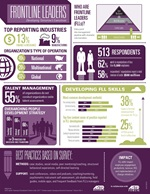ATD Blog
A Key to Organizational Success is the Development of Frontline Leaders
Thu Oct 31 2013

Transitioning from an individual contributor to a frontline leader (FLL) within an organization can be a challenge for both the individual and the organization. Unlike some roles where there may be an interim period of transition, moving from an individual contributor to frontline leader can happen overnight. The individual must transition from doing the work to now supervising the work, and the organization must take responsibility for ensuring the FLL receives the appropriate training to be a successful leader.
The ASTD study Frontline Leaders: Developing Tomorrow’s Executives examines frontline leadership development, its importance to companies, and what organizations are doing to prepare their emerging leaders.
FLLs provide a link between individual contributors and upper management, provide training to employees, build the image of the organization, assume responsibility for the quality and quantity of production, and serve as the gateway into the managerial hierarchy. When selecting a FLL the organization must determine whether the individual is ready for this next career step based on their appropriate skill set.
It is critical for FLLs to develop management and interpersonal skills which will improve employee retention and business. Lack of competent managers can cost the organization time and money to hire and train new staff. In a DDI white paper, “Optimizing Your Leadership Pipeline for: People Leaders,” vice president Jim Concelman states, “Frontline leaders are being asked to fulfill a growing number of complex and ever-changing roles, requiring a closer look at the selection and development of these key players.”
While frontline leaders are critically important to organizations, ASTD’s research shows only 38 percent of the 513 participants, state that their organizations have a formal development process for FLLs, with 20 percent reporting they have one in development, and another 16 percent wishing this process was offered.
Of the organizations that do offer FLL training, the most commonly reported methods used in the FLL development process are peer coaching/mentoring, self-directed learning, and just-in-time (JIT) training, rather than using a more balanced approach including methods such as face-to-face interaction, case studies, coaching, or social media. According to the study, not using a balanced approach may hinder FLL training effectiveness.
Because frontline leaders play such a vital part in an organization’s success, drastic improvements are needed in their development. Management involvement in the training process is severely lacking and only 25 percent of the participants surveyed in the ASTD study found the FLL development process “very effective” or “effective”, leaving much room for improvement.
